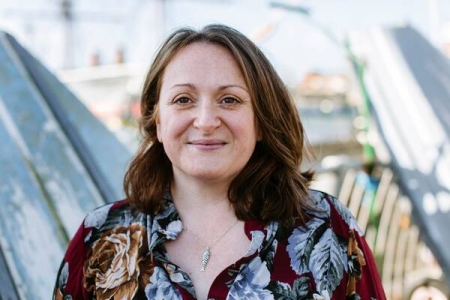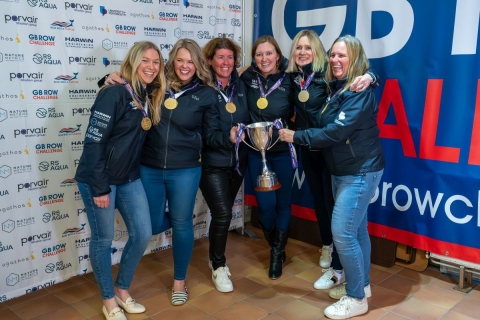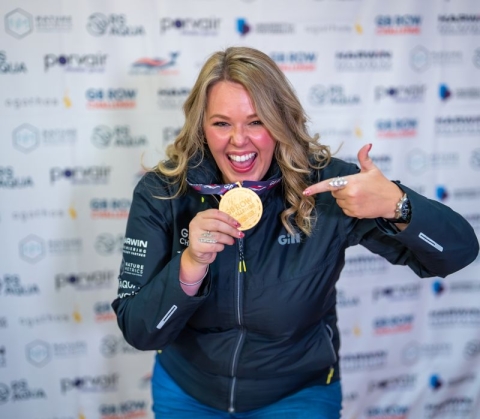Team Ithaca, the crew who set a new Guinness world record for the fastest female team to row around Great Britain, received their medals and cup at an awards ceremony on Saturday.
The presentation evening honoured the achievement of the team who battled torrential rain, strong winds, lightning and thunder to complete the GB Row Challenge in 44 days, 20 hours, 19 minutes and 34 seconds.
As well as completing the challenge, the rowers were collecting scientific data for University of Portsmouth experts to analyse.
Professor Fay Couceiro is lead scientist for the partnership between GB Row Challenge and the University. She gave a presentation and thanked the rowers for collecting data which enhances our understanding of the many challenges facing British coastal waters.

I could not do any of this research without the people who collected this data, so I am very grateful for their extraordinary efforts.
Fay Couceiro , Professor of Environmental Pollution
Professor Couceiro said: "Nine out of 10 fish species in the world live in coastal waters. We think about the open ocean being full of biodiversity, but actually it's quite barren out there. It's really the coastal waters - where the light penetrates and there's lots of food - that you find an abundance of species.
"In 2022, we found evidence of 82 species in 77 litres of water and 33 of those were just near the Isle of Wight, literally right here on our doorstep. In this water sample, there was environmental DNA from dolphins, seals, and different types of fish, including wrasse and gobies. And there were sand eels, which are a keystone species meaning that if they're healthy, then other species are too."

Team Ithaca (l-r): Emma Haxell, Amy L Wood, Clair Fennessy, Emma Wolstenholme, Sandra Gates, Maggie Hodge
Professor Couceiro also talked about the other data collected during the row - microplastics, noise pollution and temperature, and played dolphin noises recorded by Team Ithaca's boat.
She added: "I could not do any of this research without the people who collected this data, so I am very grateful for their extraordinary efforts."
The rowers were trained to use the boat's scientific equipment by Professor Couceiro and colleagues at the University, and Dr Kat Bruce from NatureMetrics.
Crew member, Amy L Wood, said: "We had to learn how to troubleshoot so we could collect the scientific data regardless of what happened. We were taught you had to roll up your sleeves to avoid getting any fibres from your clothing on to the microplastics filter, and to make sure you're using tweezers so you don't touch anything with your hands."

Amy L Wood with her GB Row Challenge medal
The rowers talked about some of the highs and lows of the challenge, including how they kept themselves motivated when rowing in the middle of the night.
Amy said: "We had to try to do things to keep ourselves laughing, particularly during the 3am rowing shift, which we called the death shift. We found this guy called Leon who did a quiz every week on Spotify. The questions were bizarre, we couldn't answer most of them, it went too quickly for us to think and we didn't want to pause it because our hands were on the oars, but we went with it and it made the shift go really quickly."
Rower Clair Fennessy added: "Our first goal was to get round safely and the second goal was to smash the world record. But we also made a commitment as a crew that we would collect that scientific data and as you've seen from Professor Couceiro's presentation, it's mega important."
The team raised over £17,500k for the Can Rehab Trust, a charity which helps people living with and beyond cancer to become or stay active.
Can Rehab Trust founder and chair, Professor Anna Campbell, said: "All the money goes to cancer patients. During covid, over 1,700 people with cancer got a one to one six-month programme free of charge with a cancer exercise expert who gave nutritional, exercise and emotional support.
"All this money raised goes to pay these amazing instructors to work with people with cancer, so thank you so much for what you've done to raise the profile of the charity."






